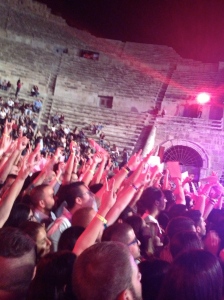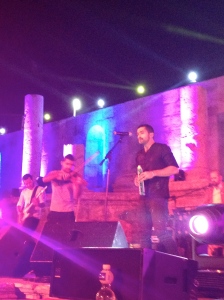During my third week here, one of my Jordanian friends from when I was a camper at Seeds of Peace invited me to go to a concert with some of his friends. Since I am here exploring the arts, love music and am generally desperate for any kind of social invitation from people my age (although that’s nothing new), I immediately said yes. The band we were going to see was Mashrou’ Leila, a popular alternative group from Lebanon whose name translates into either Leila’s Project or A Night Project, depending on whether “Leila” refers to someone’s name or to the Arabic word for “night.” They are known for the controversial political and social messages in their music throughout the Arab world and have a growing fan base in other demographics as well. The venue for the concert was an ancient Roman amphitheater in downtown Amman. Casual.
As we drove to the concert, my friend Laith and his friends George and Suha filled me in on everything Leila-related I needed to know. George, by far the most passionate and obsessed member of our group (we dug around in the trash outside where we ate dinner for 15 minutes searching for materials with which he could make a sign for the band since he had forgotten to bring one), walked me through a few of their most well-known and contentious songs. He explained that since the lead singer, Hamed Sinno, is openly gay and sings songs containing messages and sentiments expressed from one male pronoun to another, the band has made waves at a number of Arabic music festivals and performances. Their music is also often highly critical of prominent leaders and accepted social norms in the Arab world. George taught me a few key lyrics to listen for so I would know what each song was generally about at the concert. George also warned me to try to keep my distance from him at the concert because his singing would possibly ruin the experience for anyone close enough to hear him. All of his advice proved to be quite useful.
When we arrived, Laith and I went and staked out some standing area near the front of the stage while George and Suha frantically asked every security guard they could find for a pen to use to write on the scrap of cardboard they had salvaged from the garbage. They returned with a crooked sign that faintly read: “I Saw Leila Twice Before I Die.” George beamed with pride as he waved it energetically in the air. People around us squinted to see what it said. I commenced with maintaining the suggested distance from him.
The concert was, hands down, one of the best live shows I have ever been to. I realize this list includes Clay Aiken, Demi Lovato, and the Jonas Brothers, but it also includes Ray Charles, Carole King, and Zac Brown Band. I will further contend that although the Clay Aiken concert was a pretty weird experience, everyone underestimates the talent of Demi and the JoBros and they were both great performers. Joe Jonas actually sprayed me with his water bottle from onstage, yet I had an equally if not more amazing time at Mashrou’ Leila — and their music is in an entirely different language. I probably understood less than five percent of what they said or sang. But that’s the thing about music — you can understand it without actually understanding it. Ew I can’t believe I just wrote that. Regardless, it’s true. The band is incredibly talented, and their music is extremely moving.
I always struggle at concerts when I am near the stage because I hate navigating the passive-aggressive, and sometimes outright aggressive, game of trying to get closer and moving past people without being obvious that you are trying to get closer and moving past people. This became a harrowing contest five years ago at the JoBros concert in particular: imagine, my 17-year old friend and myself up against a sea of lovestruck preteens and their protective mothers. To this day, I cannot forget the stabbing glares of judgment from the JoMoms as they encouraged their screaming JoLittleGirls to disregard and simply shove past the JoJuniorsInHighSchool who were very inappropriately freaking out at the concert of Disney Channel stars. Of course, we responded with the “pretend I don’t see you but use my peripheral vision to gauge exactly where you are and subsequently block you from getting by without making eye contact so it seems like the natural movement of my body is only in response to the great musical experience we are sharing” method. It worked long enough to feel Joe Jonas’s backwash on my hands and get an uncomfortably close look at Kevin’s skinny jeans. Definitely worth it.
At Mashrou’ Leila, I braced myself for similar crowd management routines. It seems, however, that Arabs have no patience for these silly games. When people behind me tried to push forward, I placed myself in the usual odd little athletic stance and looked straight ahead, ready for them to come from either side. I usually ended up just falling over onto the person next to me, which unfortunately too often happened to be George and his singing. I soon realized that no one else was employing these strategies. When people at this concert tried to push forward to reach the standard unrealistically small spaces people at concerts are convinced they will fit into, those around them took a very straightforward approach and merely shouted above the music, “Habibi (my dear friend/loved one), there’s no room there. You can try, but I don’t know what you think you’re going to accomplish.” Then the pushy person would sigh and step back to her or his original spot, and it was over. If only the Jonas Brothers fan base were this reasonable.
Even though I went into this concert knowing the lead singer was gay, it felt like The Lance Bass Experience all over again. Maybe even more so, and that’s saying a lot, since I used to keep my *NSYNC calendar on August all year long because that was Lance’s solo picture month. As soon as Hamed got onstage, I was smitten (and then instantly heartbroken). It is not often that performers simultaneously display natural charisma and deep humility, but he achieved the balance perfectly — not to mention his beautiful voice and total emotional investment in every song. The band members had incredible chemistry, even though one of their members, the only female, had apparently dropped out just before the concert and they had to bring in a replacement on short notice. The audience loved them. With crazy smoke and mirrors effects now basically a given part of live shows in the United States, it was a privilege to be at a concert where the audience worshipped the band solely for its music and its messages and the location naturally provided a unique atmosphere. Thanks, Romans.
During one particular song, my favorite of the whole night, in which everyone was singing along to every word and Hamed was especially wrapped up in the performance, I turned to George and asked what it was about. “This is the most famously controversial one, about his ex-boyfriend,” he told me. “It’s called Shim El Yasmine, which means Smell the Jasmine.” In front of me, I noticed a couple — two males — singing along and holding each other. This is amazing, I thought to myself. We are in this ancient theater in a society in which homosexuality is extremely controversial, and here are thousands of young people, male and female alike, singing along with a gay performer about lost love. I realized this was probably one of the only spaces here, in a society continuously navigating between tradition and modernity, where youth could gather and express themselves so freely without fear of judgment or punishment.
No sooner had I finished thinking this when a girl around my age, who had just been singing along to Shim El Yasmine, went over to some security guards standing nearby and pointed out the gay couple. The guards immediately came over and removed them from the concert, and that was the end of their Mashrou’ Leila experience. I was shocked. Even here, even at this concert of all concerts, this had happened. I wasn’t sure then, and I still am not sure now, what this observation means; that an openly gay Arab singer can have sold out concerts across the Middle East but that concert attendees cannot be openly gay — even in this seemingly exceptional context of the concert — or that a Jordanian girl can be a fan of a gay celebrity but actively oppose the existence of his gay fans. It’s not for me to decide what it means, especially since although we have thankfully moved past the criminalization of homosexuality in America, I know there are many Americans who fit the same profile of this Jordanian girl and accept homosexuality at some levels but not at others. Nonetheless, witnessing this contradiction of cultural values made me think quite a bit about the kinds of dynamics at play in this society.
That night, I returned home and found the new Mashrou’ Leila album online. I clicked to Shim El Yasmine and listened to it on repeat until I fell asleep, thinking about everything I had seen and heard at the concert. Some of it gave me hope, and some of it gave me pause, but ultimately it was just amazing music made even more amazing by becoming a new vessel for the kinds of messages Arab youth want to express about their governments and societies. And most readers will be happy to know that by the time I woke up, Shim El Yasmine had a higher play count on my computer than any Jonas Brothers song I own.


How could you have forgetten Christmas with Cornils…?
I don’t know Eileen, I think Clay Aiken was pretty cool!
I stopped reading this when you started talking about the Jonas Brothers because I wanted to remind you and everybody that I was in their 3D movie.
Great, thoughtful post! I really enjoyed it. I recently saw the Orquesta Arab de Barcelona perform here in Sevilla, also outdoors, in a modern theater that was made to look like some ancient Arab construction. I understood none of the Arabic they sang, but nonetheless had an amazing experience: https://www.youtube.com/watch?v=VYAv4oCjROA. I’m looking forward to reading more!
Excellent blog post. I certainly love this site.
Keep writing!